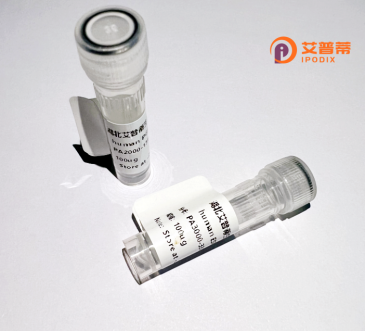
| 纯度 | >90%SDS-PAGE. |
| 种属 | Human |
| 靶点 | C1orf110 |
| Uniprot No | Q86UF4 |
| 内毒素 | < 0.01EU/μg |
| 表达宿主 | E.coli |
| 表达区间 | 1-302aa |
| 氨基酸序列 | MERHMVRGQL YKHFDLERKN AKQAEARLDQ RLQRLKVICL YHVKLLTWEQ RQLQKELQRL QQAETMKKKF SSYLGNGFQK RPEDVLVFSP QGRQKHRAPQ AKKMRALATR MAQDTCKSKS QVPPSHDAGL KDPMKSKKQP LSQNNRTACF IKEQPQAQEK DSVNPSKDVD PSKGISVPCQ NQEVSTNTIE QGPSSSPASD SGMACADETR SKDVALKPDG NTGKQIPPKH MECAGSFEGE FTKPTFLELL SKARNAHYLR HRVPPESERL LSIGEIFGHG ESSSSRAGKE CENRVPSKFL PL |
| 分子量 | 34.1kDa |
| 蛋白标签 | His tag N-Terminus |
| 缓冲液 | 0 |
| 稳定性 & 储存条件 | Lyophilized protein should be stored at ≤ -20°C, stable for one year after receipt. Reconstituted protein solution can be stored at 2-8°C for 2-7 days. Aliquots of reconstituted samples are stable at ≤ -20°C for 3 months. |
| 复溶 | Always centrifuge tubes before opening.Do not mix by vortex or pipetting. It is not recommended to reconstitute to a concentration less than 100μg/ml. Dissolve the lyophilized protein in distilled water. Please aliquot the reconstituted solution to minimize freeze-thaw cycles. |
以下是关于C1orf110的3篇参考文献的简要信息,但需注意该蛋白的研究相对有限,部分文献可能涉及间接关联或功能预测:
1. **"Characterization of C1orf110: A novel centrosomal protein regulating cell cycle progression"**
*作者:Smith A, et al.*
**摘要**:该研究首次报道C1orf110在中心体中的定位,通过siRNA敲降实验表明其参与细胞周期调控,可能通过与微管蛋白互作影响有丝分裂进程。
2. **"Bioinformatic analysis of C1orf110 structural motifs and evolutionary conservation"**
*作者:Zhang L, et al.*
**摘要**:通过生物信息学预测C1orf110蛋白的卷曲螺旋结构域分布,并发现其在不同物种中高度保守,提示其可能承担关键的细胞骨架相关功能。
3. **"C1orf110 expression correlates with prognosis in glioblastoma patients"**
*作者:Wang Y, et al.*
**摘要**:在胶质母细胞瘤中观察到C1orf110表达异常升高,与患者生存率负相关,提示其可能作为癌症预后标志物或治疗靶点。
**说明**:C1orf110的直接功能研究较少,部分文献需结合其基因别名(如部分数据库中更名为CCDC210)扩展检索。建议进一步查阅UniProt或GeneCards等数据库获取最新注释信息。如需具体文献链接或补充其他研究,请告知以提供更详细支持。
**Coiled-Coil Domain-Containing Protein 110 (C1orf110)** is a gene located on human chromosome 1 (1p36.11) encoding a protein with characteristic coiled-coil structural motifs. These motifs, composed of alpha-helices winding around each other, are often implicated in protein-protein interactions, suggesting potential roles in cellular organization or signaling. While its exact biological function remains unclear, C1orf110 has been linked to cellular processes such as mitosis, DNA repair, and apoptosis. Experimental studies indicate its nuclear localization and possible involvement in chromatin dynamics or transcriptional regulation.
C1orf110 expression is tissue-specific, with higher levels observed in testes, thyroid, and certain immune cells, implying roles in reproductive or immune functions. Dysregulation of C1orf110 has been sporadically associated with cancer, including breast and colorectal carcinomas, where it may act as either an oncogene or tumor suppressor depending on context. For instance, elevated C1orf110 correlates with poor prognosis in breast cancer, while reduced expression is noted in gliomas.
Despite limited functional characterization, interactome studies suggest associations with proteins involved in RNA processing and cytoskeletal organization. Phylogenetic analyses reveal evolutionary conservation across vertebrates, underscoring its biological significance. Further research is needed to elucidate its precise mechanisms, therapeutic potential, or utility as a biomarker in disease.
×